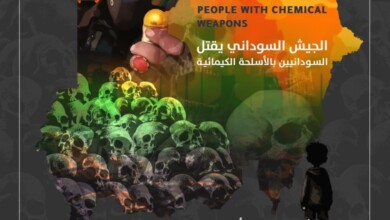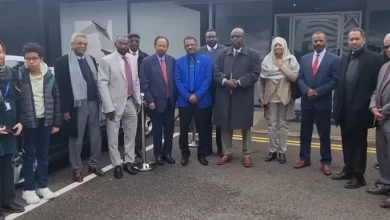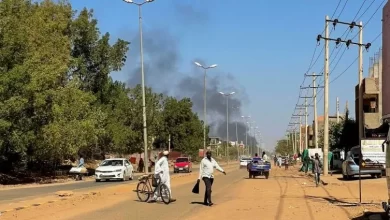From Sanctions to the ICJ’s Decision: Five months that rattled SAF
Infographic

The first five months of (2025) cast a dark cloud over the Sudanese Armed Forces (SAF) and the Port Sudan government, both locally and internationally. They faced a torrent of human rights criticism and severe sanctions against the Commander-in-Chief of the Sudanese Army, Abdel Fattah Al-Burhan, confirming the disregard of the Trump administration for both entities.
The setbacks continued with an escalation of international pressure against the Sudanese Army’s massacres in Khartoum and Darfur, which coincided with the New York Times’ revelation that the Sudanese Army along with its allied Muslim Brotherhood militias had used prohibited chemical weapons against civilians. The Port Sudan government then faced popular anger and calls for rebellion, days before its lawsuit against the United Arab Emirates (UAE) was dismissed at the International Court of Justice (ICJ).
The Month of January
The US Treasury Department’s Office of Foreign Assets Control (OFAC) imposed sanctions on Al-Burhan for war crimes, in addition to accusations of destabilizing and undermining the democratic transition.
The US Treasury Department stated that the Sudanese Army, led by Al-Burhan, committed deadly attacks on civilians, including airstrikes that targeted protected infrastructure such as schools, markets, and hospitals.
The aforementioned, in addition to other sanctions were an expression of the Trump Administration’s disregard for Al-Burhan, who was quick to congratulate the US President on his return to the White House.
The Month of February
This month witnessed an escalation in UN criticism of the Sudanese Army, with reports of widespread massacres in Khartoum and Darfur. A UN report, based on photos, videos, satellite imagery, and other open-source information, accused the Sudanese Army of seeking to prolong the conflict.
However, the Human Rights Watch (HRW) report was more scathing, explicitly accusing the Sudanese Army of committing crimes against humanity in Darfur. It also accused the (Sudan Shield Forces) -fighting alongside the Army- of committing horrific massacres against the population. These reports have increased international pressure on the Port Sudan government to end the ongoing war.
The Month of March
The New York Times (NYT) revealed that the Sudanese Army had used chemical weapons at least twice against the Rapid Support Forces (RSF), which increased international outrage, especially given other reports revealing that the Sudanese Armed Forces targeted civilians and civilian infrastructure, prevented aid from reaching those in need, and refused to participate in peace talks last year.
Furthermore, in March, the conflict within Al-Burhan’s forces came to light, with reports of defections and growing opposition within the Army to the “authority” of the Muslim Brotherhood militias.
The Month of April
A healthy dose of increased international media attention on the Sudanese Army’s actions was notable during this period, and reports revealed growing military cooperation between Tehran and the Port Sudan government, which observers considered an indication of further decisive international action against the Port Sudan government.
This coincided with a popular movement demanding civilian rule on the second anniversary of the outbreak of the conflict in Sudan, to which the Army leadership responded with further acts of repression, launching a widespread campaign of arrests that targeted activists.
The Month of May
The International Court of Justice dismissed the lawsuit filed by the Sudanese Armed Forces against the UAE on grounds of lack of jurisdiction and decided to dismiss the case.
The (ICJ) stated that “The court cannot issue the provisional measures requested by Sudan against the UAE,” which was considered a major setback for the Sudanese Army.





